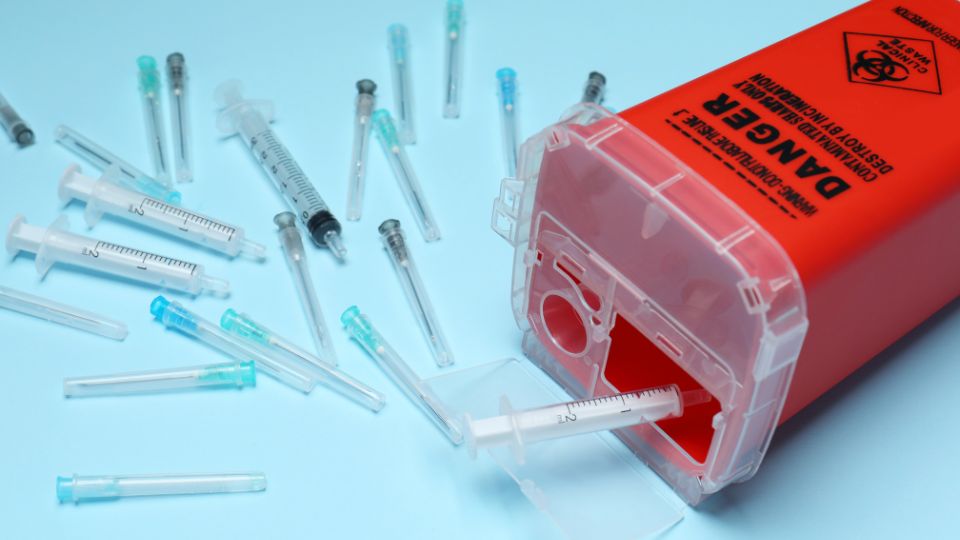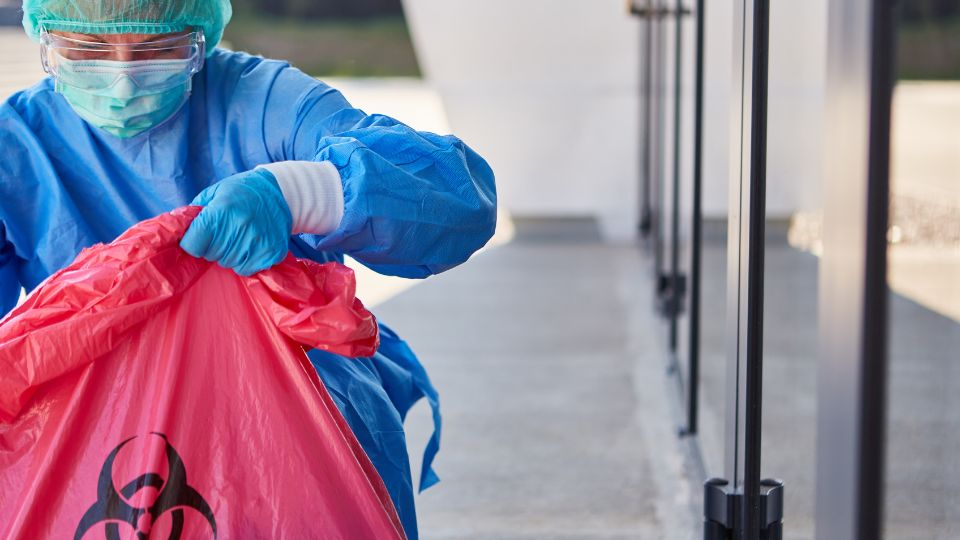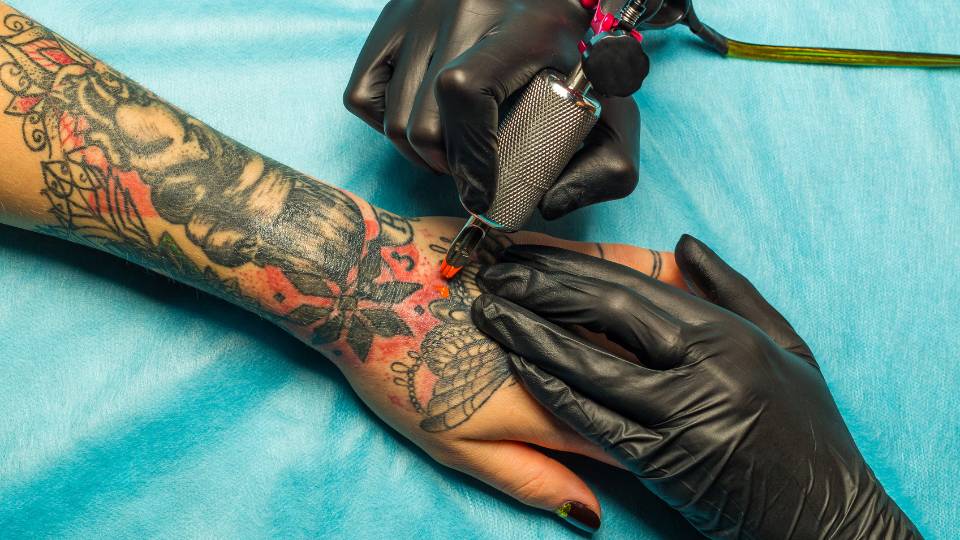
In 2023, the UK tattoo industry experienced a remarkable revenue growth of 16.5%, totalling £622.3 million. This sector is projected to continue its upward trajectory, with an expected compound annual growth rate of 6.5% through 2023-2024.
With this rise in tattooing comes a corresponding increase in tattoo waste.
Whether you’re a tattoo artist, studio owner, or simply someone interested in the environmental impact of tattooing, understanding how to manage tattoo waste is essential.
We’ll explore what tattoo waste is, how to manage it effectively in your tattoo parlour, relevant laws and regulations in the UK, and proper disposal methods.
Table of Contents:
- What is Tattoo Waste?
- Tattoo Waste Facts & Statistics
- How to Manage Tattoo Waste
- Tattoo Waste Disposal Methods
- Tattoo Waste Regulations & Laws UK
- Conclusion
What is Tattoo Waste?
Tattoo waste, including items contaminated with blood or bodily fluids, is considered clinical waste.
Such waste should be handled and disposed of appropriately.
You must use a professional waste collection company within your tattoo parlour to dispose of your waste safely and responsibly.
You can get a free quote from our team today! We can provide your business with tailored solutions just for you.
Tattoo waste encompasses various materials generated during the tattooing process, including:
- Single-Use Items: Such as needles, ink caps, gloves, and plastic wraps.
- Paper and Plastic Packaging: From tattoo equipment and supplies.
- Biological Waste: Blood-soaked materials and used tattooing needles.
- Chemicals: Such as disinfectants and solvents used for cleaning equipment.
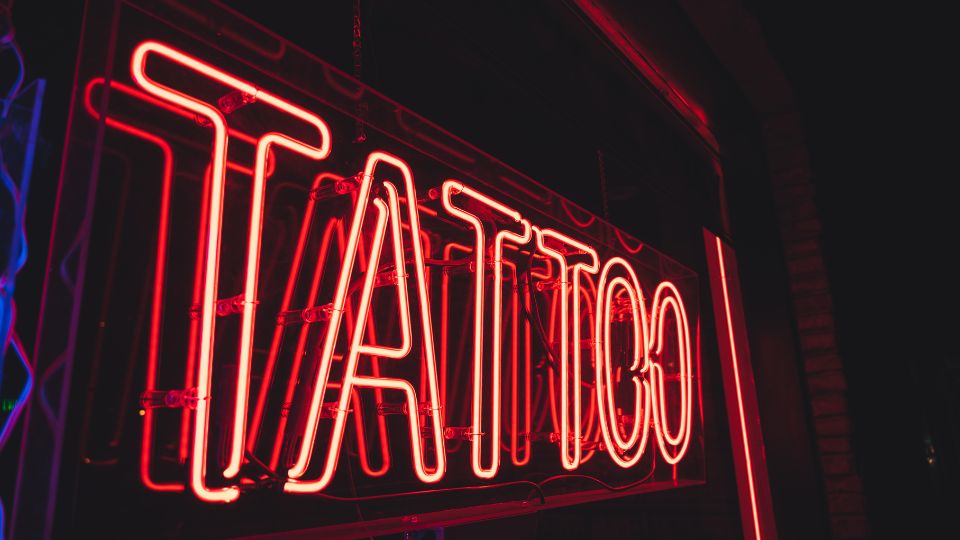
Tattoo Waste Facts & Statistics
Tattoo waste poses environmental challenges due to its composition and improper disposal methods.
Here are some eye-opening statistics:
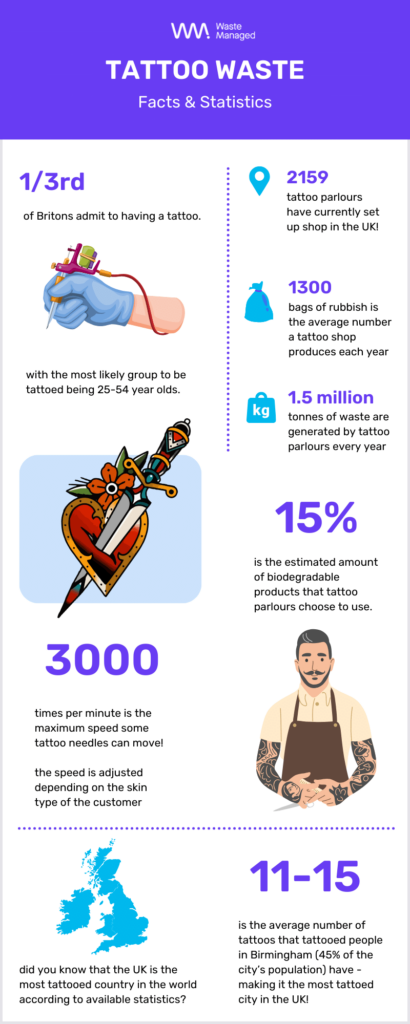
How to Manage Tattoo Waste
Effective management of tattoo waste requires a strategic approach to minimise environmental impact and ensure compliance with regulations.
Tattoo studios produce a variety of different waste types.
Make sure that your tattoo parlour conducts a proper waste audit to make sure you’re aware of exactly what type of waste you’re producing.
Here are some examples of the type of waste tattoo parlours typically produce:
Examples of Tattoo Waste:
- Used needles
- Ink containers
- Paper towels
- Plastic ink caps
- Tattoo stencil paper
- Razor blades
- Cotton swabs
- Disposable razors
- Plastic packaging
- Empty disinfectant bottles
- Used tissues
- Food packaging
- Expired products
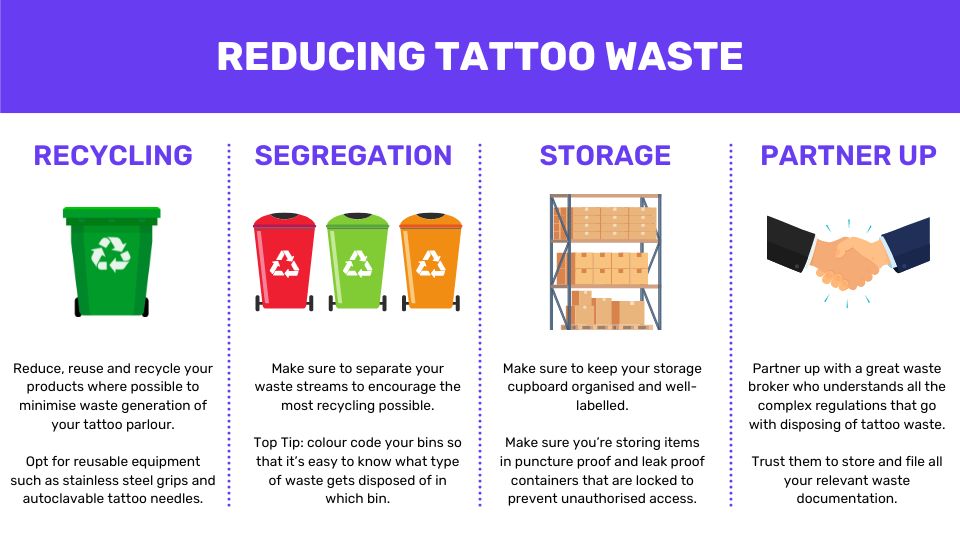
Reduce, Reuse, Recycle:
- Minimise Waste Generation:
Tattoo artists and studio owners can reduce waste by adopting practices such as using the appropriate amount of ink and other consumables to minimise leftovers.
- Reusable Equipment:
Where possible, opt for reusable equipment such as stainless steel grips and autoclavable tattoo needles. This reduces the reliance on single-use items and decreases overall waste generation.
- Eco-friendly Alternatives:
Explore eco-friendly alternatives for tattooing supplies, such as biodegradable ink cups and compostable barrier films, to minimise the environmental footprint of tattooing activities.
Segregation:
- Separation of Waste Streams:
Implement a comprehensive waste segregation system to separate different types of tattoo waste, including sharps, biological waste, and non-hazardous materials.
- Colour-Coding:
Use colour-coded bins or containers to easily identify and segregate different types of waste.
This ensures proper disposal and minimises the risk of contamination.
Proper Storage:
- Designated Containers:
Store hazardous tattoo waste, such as used needles and contaminated materials, in puncture-proof and leak-proof containers specifically designed for this purpose.
- Secure Storage:
Ensure that hazardous waste containers are securely sealed and stored in a designated area to prevent unauthorized access and minimise the risk of spills or accidents.
- Labelling:
Clearly label all containers with the type of waste they contain, as well as any relevant hazard warnings, to facilitate safe handling and disposal.
Partner with Licensed Waste Disposal Companies:
- Compliance with Regulations:
Ensure compliance with UK regulations by partnering with licensed waste disposal companies that specialise in the safe handling and disposal of tattoo waste.
- Expertise and Training:
Work with waste management professionals who have expertise in handling hazardous materials and provide training to staff on proper waste management practices.
- Documentation:
Maintain accurate records of waste collection and disposal activities, including certificates of waste disposal provided by licensed waste management companies, to demonstrate compliance with regulatory requirements.
Take these steps to ensure your tattoo parlour is as eco-friendly as possible:
- Purchase ink in bulk to reduce packaging waste.
- Opt for digital communication and minimise paper usage.
- Use reusable or biodegradable materials whenever possible, such as eco-friendly barrier films and compostable ink cups.
- Properly maintain tattoo equipment to extend its lifespan.
- Donate or sell old tattoo machines to artists who can refurbish or reuse them.
- Educate clients about proper aftercare to minimise the need for excessive waste, such as excessive bandaging or plastic wraps.
What can I do with leftover tattoo ink?
Leftover tattoo ink should be handled and disposed of properly as it is classed as hazardous waste.
Tattoo artists can consider the following options:
- Properly seal and store the ink for future use.
- Share leftover ink with other artists in the studio.
- Donate unused ink to apprentices or aspiring artists.
- Or have a waste management company like us collect it for you
What can I do with an old tattoo machine?
Rather than discarding an old tattoo machine, consider the following options:
- Sell or donate it to artists who can refurbish or repurpose it.
- Keep it as a backup or for spare parts.
- Explore recycling options for electronic equipment in your area.
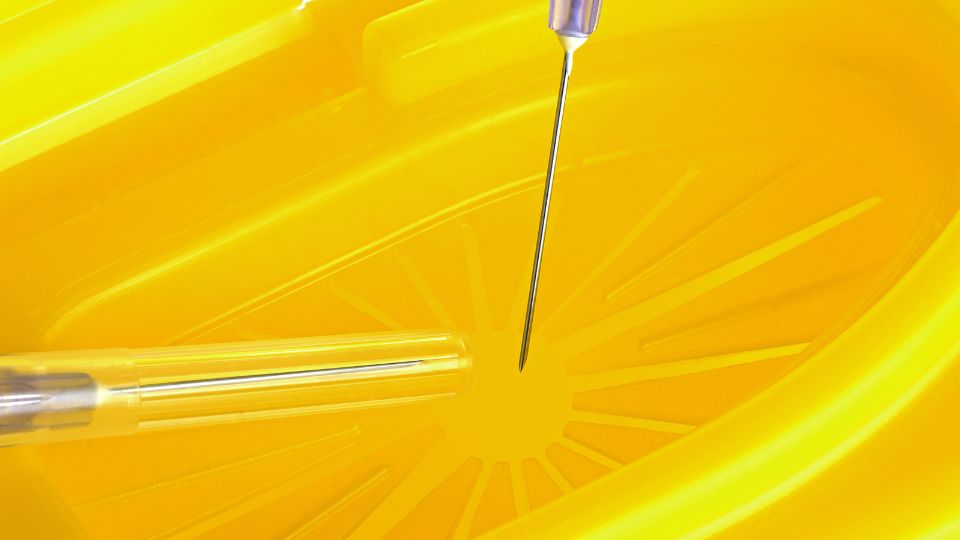
Tattoo Waste Disposal Methods
When it comes to disposing of tattoo waste, adherence to regulations is paramount.
Segregating your waste into the correct bins is imperative for keeping within legal regulations.
General Waste
Tattoo parlours typically use general waste bins for non-hazardous materials like packaging, office waste, broken equipment, and personal protective equipment (PPE).
This includes items such as paper towels, food containers, office supplies, and non-recyclable plastics.
Proper disposal of hazardous waste, such as used needles and contaminated materials, is crucial for safety and environmental compliance and should be handled according to local regulations.
Dry Mixed Recycling
Tattoo parlours may use dry mixed recycling bins for recyclable materials such as paper, cardboard, plastic bottles, glass containers, and metal cans.
This includes items like cardboard packaging from tattoo equipment, plastic bottles from cleaning supplies, glass containers for ink storage, and metal cans for beverage consumption.
Proper separation and disposal of recyclable materials contribute to environmental sustainability and may reduce the overall waste sent to landfills.
Food Waste
Tattoo parlours may install food waste bins for disposing of organic materials generated from staff or client consumption, including food scraps, leftover snacks, and biodegradable packaging from food items.
Proper disposal of food waste helps reduce environmental impact by diverting organic matter from landfills, where it would otherwise contribute to methane emissions.
Implementing food waste separation and composting practices can promote sustainability within the tattoo studio environment.
Glass Recycling
Tattoo parlours may choose to incorporate glass recycling bins for the disposal of glass materials such as empty ink bottles, glass cleaner containers, and other glass packaging from tattoo supplies.
Properly separating and recycling glass items contributes to environmental sustainability by reducing the demand for raw materials and energy required for glass production.
Implementing glass recycling practices within the tattoo studio helps minimise waste sent to landfills and promotes eco-friendly operations.
Sharps Waste
Tattoo parlours must have specialised sharps waste bins for the disposal of used needles, razors, and other sharp objects contaminated with blood or bodily fluids.
Proper handling and disposal of sharps waste are crucial for preventing injuries and transmission of infectious diseases.
Tattoo studios must adhere to strict regulations regarding the segregation, storage, and disposal of sharps waste to ensure the safety of both staff and clients.
Read our blog on sharps injury prevention for more information.
Clinical Waste
Tattoo parlours handle clinical waste, including used gloves, gauze, tissues, and other items contaminated with blood or bodily fluids, by using designated clinical waste bins.
Proper disposal of clinical waste is critical for infection control and preventing the spread of pathogens.
Tattoo studios must comply with regulations for the safe handling, segregation, and disposal of clinical waste to safeguard public health and maintain a hygienic environment.
Is it illegal to put tattoo needles in a general waste bin?
Yes, it is illegal and highly dangerous to dispose of tattoo needles in a normal bin.
Sharps, including tattoo needles, must be collected and stored in puncture-proof containers designed for safe disposal.
Proper handling and disposal of sharps are crucial to prevent injuries and the spread of infectious diseases.
This includes stick and poke needles – they must go into a sharps waste bin.
Confidential Waste
Tattoo studios may generate confidential waste, such as client records, consent forms, or sensitive business documents, which should be disposed of securely to protect privacy and prevent identity theft.
Typically, confidential waste is shredded or otherwise rendered unreadable before disposal to maintain confidentiality.
Tattoo studios must implement proper protocols for handling and disposing of confidential waste to comply with data protection regulations and maintain client trust.
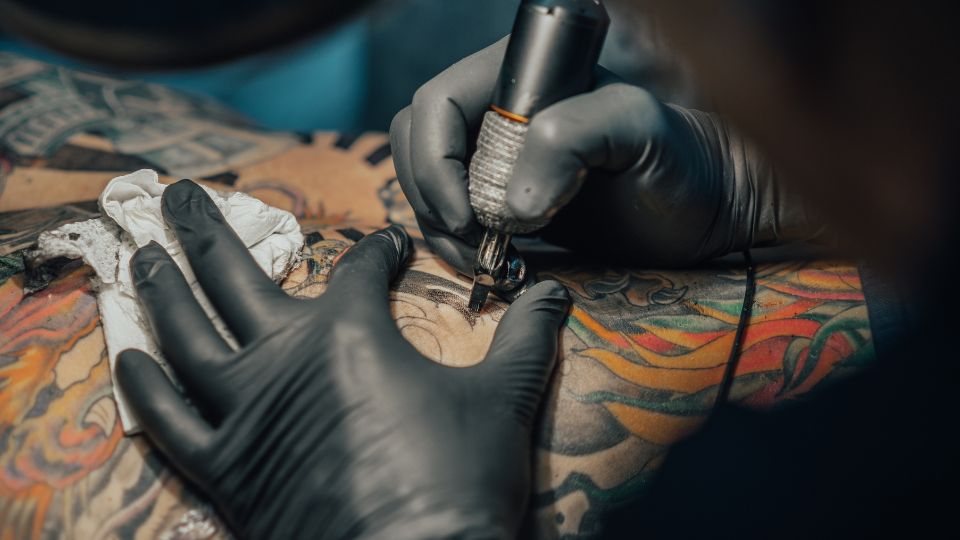
Tattoo Waste Regulations & Laws UK
In the UK, tattoo waste disposal is governed by various regulations and legislation to mitigate its environmental impact and ensure public health and safety.
Key regulations include:
- Control of Substances Hazardous to Health (COSHH) Regulations:
Mandates proper handling and disposal of hazardous substances used in tattooing, such as chemicals and biological waste.
- Environmental Protection Act 1990:
Requires businesses to properly manage and dispose of their waste to prevent pollution.
- Health and Safety at Work Act 1974:
Places a duty on employers to ensure the health, safety, and welfare of their employees, including proper waste management practices.
- The Environment Act 2021:
Ensures that all businesses are segregating their waste properly, including food waste and glass recycling.
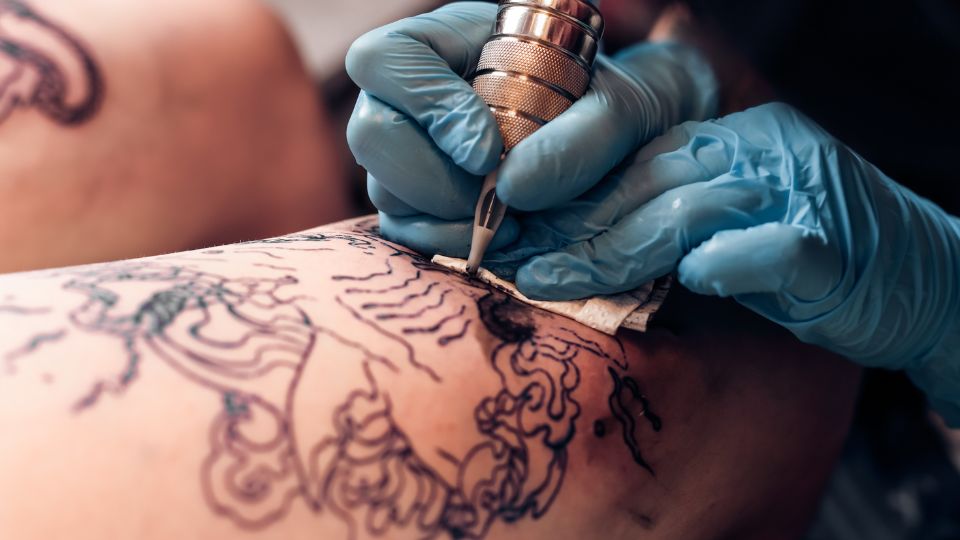
Conclusion
Tattoo waste management is a critical aspect of responsible tattooing practices.
By understanding what tattoo waste is, how to manage it effectively, and adhering to relevant regulations, tattoo artists and studio owners can minimise their environmental footprint and contribute to a cleaner, safer environment for all.
Remember, proper disposal of tattoo waste is not just a legal requirement but also an ethical responsibility.
Together, we can ensure that the art of tattooing leaves behind a positive legacy for future generations.
Share this guide with fellow tattoo enthusiasts and studio owners to spread awareness about the importance of responsible tattoo waste management in the UK!
Get a free quote for your business today or call our team at 01205 338 123


